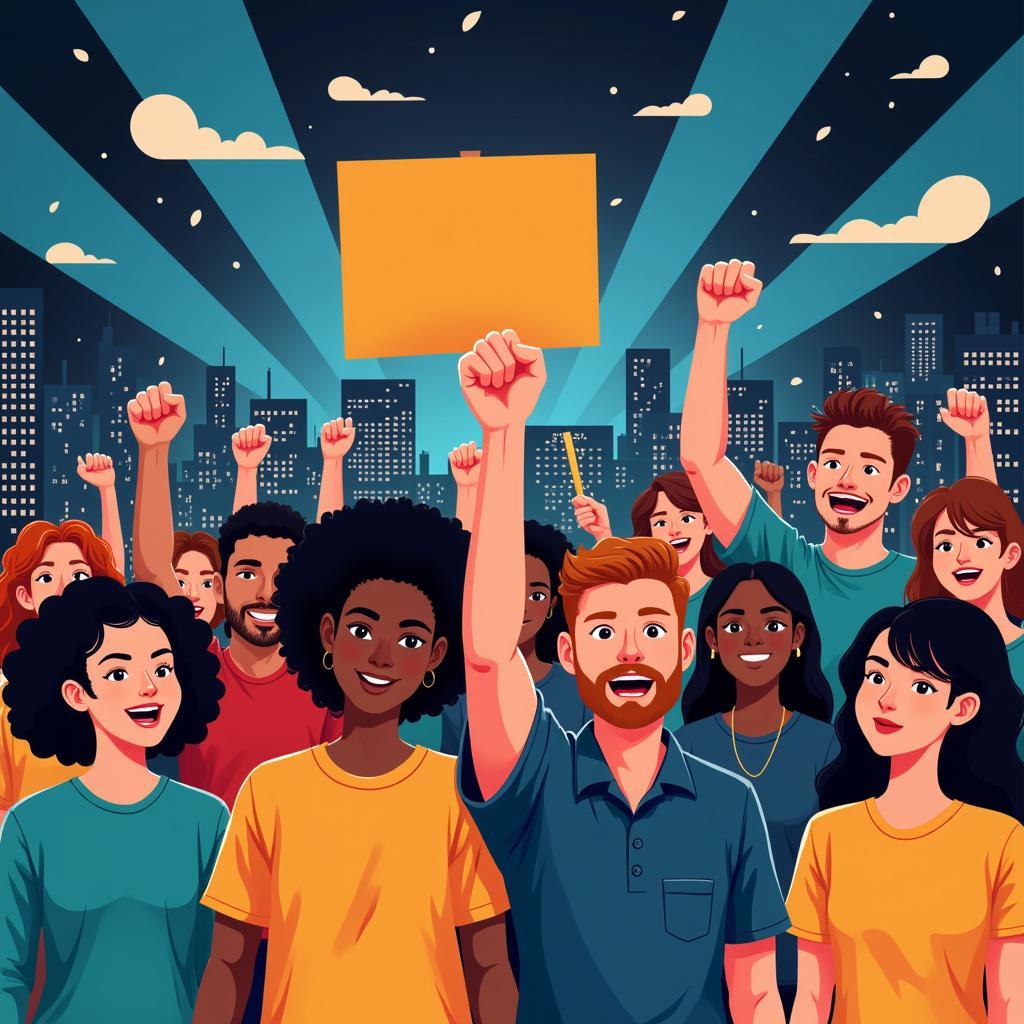The age-old struggle of “Man Versus Society” is a theme woven into the fabric of human history. It speaks to the inherent tension between our desire to forge our own paths and the expectations, norms, and constraints placed upon us by the social structures we inhabit. This conflict, often depicted as a battle between individual will and societal pressure, raises profound questions about conformity, rebellion, and the very nature of what it means to be human.
The Pressure to Conform: Where Does the Individual End and Society Begin?
From a young age, we are conditioned to fit into pre-existing molds. Family, education, and cultural norms shape our values, beliefs, and behaviors. We learn the unspoken rules of social engagement, the boundaries of acceptable conduct, and the aspirations considered “normal” within our particular societal context. This process of socialization, while crucial for maintaining order and cohesion, can also stifle individuality and create a sense of alienation for those who don’t fit neatly into the prescribed boxes.
The desire to belong, to be accepted and valued by our peers and communities, is a powerful motivator for conformity. We may suppress our true selves, silencing our unique voices and passions, in order to avoid judgment, rejection, or even ostracism. This internal conflict between authenticity and conformity can manifest in feelings of anxiety, self-doubt, and a sense of being unmoored from one’s true north.
The Urge to Rebel: Challenging the Status Quo for Progress and Justice
However, the human spirit also yearns for freedom, autonomy, and the space to express its individuality. Throughout history, individuals and movements have risen to challenge oppressive systems, fight for social justice, and push the boundaries of what is considered acceptable or “normal.” These acts of rebellion, while often met with resistance and backlash, are essential for societal progress and the expansion of human rights and freedoms.
 Fighting for Justice
Fighting for Justice
Think of figures like Rosa Parks, who refused to give up her seat on a segregated bus, or Malala Yousafzai, who bravely defied the Taliban to advocate for girls’ education. These individuals, driven by their convictions and a deep sense of moral purpose, challenged the prevailing social order and paved the way for a more just and equitable world.
Finding Balance: Embracing Individuality While Contributing to the Collective
The “man versus society” conflict is not about a binary choice between total conformity or complete rebellion. It’s about finding a delicate balance between honoring our individuality while recognizing our interconnectedness and responsibility to the larger community. It’s about fostering a society that values diversity, encourages critical thinking, and creates space for individuals to thrive while contributing to the collective good.
How much violence is justified in changing society? This is a complex question with no easy answers, and you can explore this further in our article on how much violence is justified in changing society.
Man Versus Society in the Digital Age: Amplified Voices and New Challenges
The digital age has added new layers of complexity to the “man versus society” dynamic. On the one hand, social media and online platforms have provided unprecedented opportunities for individuals to connect, share their stories, and build communities around shared interests and values. This has been particularly empowering for marginalized groups who have historically been excluded from mainstream narratives and power structures.
However, the online world can also amplify societal pressures and create new forms of conformity and social control. The curated perfection often presented on social media can fuel feelings of inadequacy and anxiety. The constant bombardment of information and the pressure to maintain an online persona can lead to a sense of fragmentation and disconnection from our authentic selves.
Navigating the Conflict: Fostering Dialogue and Understanding
So how do we navigate this complex terrain? How do we reconcile our need for individuality with our desire for belonging? How do we leverage the power of technology while mitigating its potential pitfalls?
Here are a few key takeaways to consider:
- Embrace self-awareness: Cultivate an understanding of your own values, beliefs, and motivations. What truly matters to you? What are your non-negotiables?
- Cultivate critical thinking: Question the assumptions and norms that you have been taught. Be willing to challenge the status quo and think for yourself.
- Find your tribe: Seek out communities that align with your values and interests. Surround yourself with people who support your growth and individuality.
- Use your voice: Don’t be afraid to speak your truth, even if it’s unpopular. Your unique perspective matters.
- Practice empathy: Remember that everyone is navigating their own version of the “man versus society” conflict. Seek to understand different perspectives and build bridges of compassion.
The struggle between the individual and society is a constant dance, a push and pull that will likely continue as long as humans exist. By approaching this conflict with awareness, empathy, and a commitment to open dialogue, we can create a world where both individual and collective can thrive.
 Building Bridges of Understanding
Building Bridges of Understanding
Have you ever felt the tension between your own desires and societal expectations? How have you navigated this conflict in your own life? Share your thoughts and experiences in the comments below.